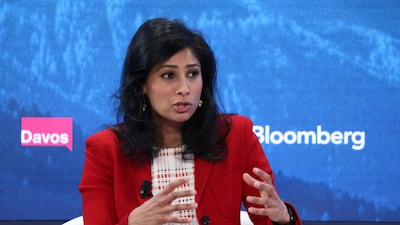The global economy needs decisive monetary policy action from central banks around the world to minimise risks stemming from the highest inflation in decades, which is threatening global economic momentum, the International Monetary Fund has warned.
Both the Covid-19 pandemic and Russia’s military offensive in Ukraine were "unique events in many respects” and “stress-tested” the monetary policy frameworks and strategies, IMF first deputy managing director Gita Gopinath said on Friday.
The pandemic and war could cause structural shifts and the current period of very high inflation poses a significant risk that inflation expectations could become de-anchored.
The two events may increase supply shock volatility and could make potential output and employment more difficult to forecast.
“Such developments, if they materialise, would pose more difficult trade-offs for central banks,” Ms Gopinath said at the annual Jackson Hole Symposium in the US.
“I’ll argue that central banks must move decisively today to avoid the risk of de-anchoring, and that global policies should push forward on the Paris climate agenda and support the expansion of diversified global trade.”
Geopolitical and economic uncertainty is mounting around the world amid a multitude of factors that have significantly slowed growth momentum.
In July, the IMF lowered its growth forecast for the global economy for the second time this year, due to Russia’s war in Ukraine that has fuelled inflationary pressures and derailed the momentum of the recovery from the Covid-19 pandemic. Worsening supply chain disruptions, higher commodity prices and a slowing Chinese economy have also added to economic uncertainty.
The IMF now projects global growth at 3.2 per cent in 2022 and 2.9 per cent in 2023, after a 6.1 per cent expansion last year.
The fund warned if more risks materialise and inflation rises further, global growth could decline to about 2.6 per cent and 2 per cent this year and next, respectively, which would put growth in the bottom 10 per cent of outcomes since 1970.
The Washington-based fund estimates inflation to average 8.3 per cent globally this year, with an aggregate of 6.6 per cent in advanced economies and 9.5 per cent across emerging market and developing economies.
A four-decade high inflation in the US as well as the UK and a similar trajectory in major European economies has led central banks to increase interest rates sharply.
In July, the US Federal Reserve increased the policy rate by 75 basis points after a larger-than-expected three quarters percentage point in June. It was the Fed's fourth interest rate increase in four months and the biggest since 1994.

Most banks around the world, including those in the six-member economic bloc of GCC have also followed suite and increased their benchmark rates.
With higher energy prices further fuelling inflation, central banks are now pushing for aggressive monetary tightening that has now stoked fears of a global recession.
Ms Gopinath said, while “running the economy hot” — being more tolerant of higher inflation — can indeed have important benefits, and is sometimes appropriate, “we need to rethink the benefits and costs in light of the more evident inflation risks”.
The “robustness of policy strategies” including running the economy hot and looking through temporary supply shocks, should be revisited, she said.
Better models of aggregate supply — including those that take more account of capacity constraints at the sectoral level — are also needed, and will help in refining policy strategies. she added.
“I am hopeful that central banks will succeed in bringing inflation back to target in the next couple years,” Ms Gopinath said.
“But with inflation running at multi-decade highs and some measures of inflation expectations flashing red, the risks of de-anchoring are significant.”


